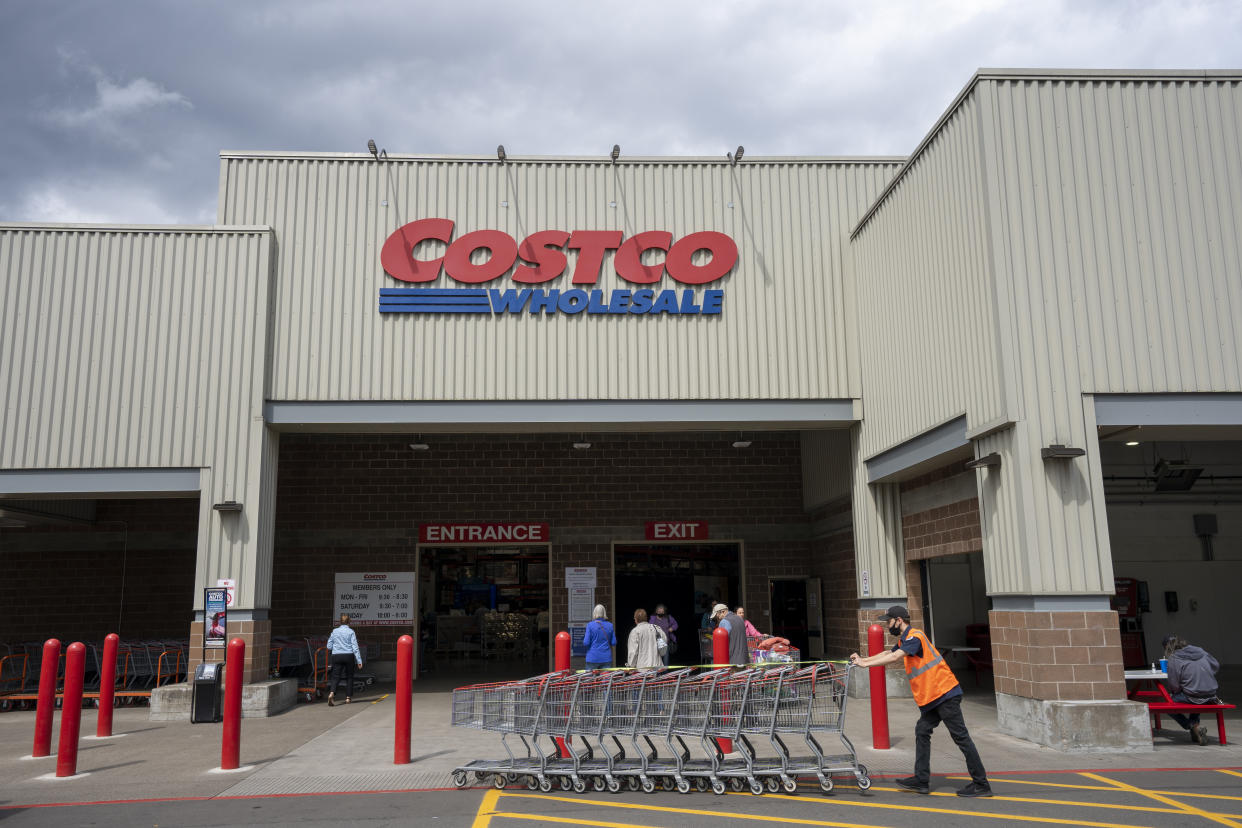Steady membership fees and cost savings helped fuel Costco (COST) to record membership renewal rates this year, driven in part by concerns about inflation.
But the Issaquah, Washington–based company has quietly emerged as a leader on another critical issue that dominated the retail sector in 2022 — labor relations and the employee push to unionize.
Rival retailers, meanwhile. have struggled to address employee demands for higher wages and better benefits while fending off efforts to organize. But Costco, Yahoo Finance's 2022 Company of the Year, has managed to separate itself from the pack, building on a reputation as one of the friendliest places to work in retail.
According to data from Glassdoor, Costco employees rated the company a 4 out of 5, putting it well ahead of competitors like Sam’s Club and Target (TGT). Longtime CEO Craig Jelinek earned an approval rating of 85% from its staff, surpassing Amazon’s (AMZN) Andy Jassy and Walmart's (WMT) Doug McMillon.
“They’ve set a higher entry-level wage, more full-time jobs, more access to employee benefits, and generally, probably better working conditions as well,” said William Brucher, an assistant teaching professor of labor studies and employment relations at Rutgers University. “A lot of that has to do with Costco’s business model, in that it makes most of its profit on memberships.”
That base annual $60 membership fee has taken the pressure off of Costco to be a “low-road employer” according to Brucher, who said the discount retailer has consistently outpaced competitors when it comes to the number of full-time employees it hires. Costco cashiers earn, on average, $32,000 a year. While just one-fifth of hourly workers at Costco are unionized, they earn largely the same pay as their non-unionized workforce.
In addition, employees who work for 180 consecutive days for more than 23 hours a week qualify for Costco’s health benefits plan, which includes medical care along with coverage for dental and vision with low co-pays, according to Glassdoor.
“This is aimed at discouraging unionization in the nonunion warehouses, and so far that aim has been met,” said Professor Ruth Milkman, Labor Studies Chair for CUNY School of Labor and Urban Studies. “Turnover is lower (typical whenever pay is higher) than in companies like Walmart; productivity is also higher – and probably morale. So Costco has developed a totally viable business model, and obviously one that is superior for the hourly employees.”
That stands in stark contrast to discontent brewing within hourly employees at chains like Starbucks (SBUX) and Amazon. For instance, warehouse workers at Amazon's Staten Island, New York, facility helped organize the company’s first-ever U.S. labor union this spring, but workers say the company has so far refused to come to the bargaining table or recognize the group as the Amazon Labor Union. While more than 300 Starbucks stores in roughly three dozen states have held union elections, the coffee chain has consistently pushed back against employee efforts, sending anti-union messaging to employees and isolating workers by announcing raises and benefits for nonunion employees.
Costco has historically been more amenable to labor groups, in part out of necessity. When Costco merged with then rival Price Club in 1993, the firm inherited a handful of stores already unionized for the Teamsters.
“We always want to make sure that our employees are at the higher end of the scale and we believe that they are at the top end,” said Jelinek in an interview with Yahoo Finance. “Of course, that starting wage is narrowed for everybody. But we wanna also pay for longevity. We do not want to turn people. We want to keep our employees.”
But the tight labor market is starting to chip away at Costco’s leadership, as rival retailers raise their own wages and compensation to secure workers. Amazon, Walmart, and Sam’s Club now offer higher wages than Costco for cashiers and sales associates, putting pressure on the firm.
This summer, roughly 18,000 Costco workers threatened to go on strike, following contentious negotiations with the Teamsters, which accused the company of attempting to become “profit-hungry wholesalers.” The dispute was resolved two months later, with the Teamsters members overwhelmingly ratifying the first national contract at Costco. The firm agreed to significant wage improvements, an increase in pension contributions, and higher semi-annual bonuses with a more flexible attendance policy.
“Costco didn’t go to war with the Teamsters. They were able to come back and agree to a better offer than what they initially wanted to get,” said Brucher. “They’re still an employer, they still have different interests. But they were able to negotiate something, and that is being very different than what Amazon or Target have done in the past.”
More Yahoo Finance Company of the Year 2022 coverage:
Meet Yahoo Finance's Company of the Year: Costco
How we chose Costco to be Yahoo Finance's Company of the Year
Costco stock: 5 takes from Wall Street analysts
Why some of our 'best company' picks didn't stay that way
Akiko Fujita is an anchor and reporter for Yahoo Finance. Follow her on Twitter @AkikoFujita
Click here for the latest trending stock tickers of the Yahoo Finance platform
Click here for the latest stock market news and in-depth analysis, including events that move stocks
Read the latest financial and business news from Yahoo Finance
Download the Yahoo Finance app for Apple or Android
Follow Yahoo Finance on Twitter, Facebook, Instagram, Flipboard, LinkedIn, and YouTube
Source: Read Full Article
